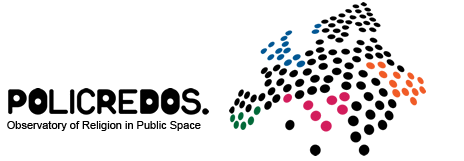POLICREDOS – MONTHLY FOCUS (January 2014)
Religion and Solidarity in times of Crisis
The first POLICREDOS – Monthly Focus is dedicated to the topic of religion and crisis, which is also both the focus of our Newsletter first issue and the topic addressed in our first seminar of the POLICREDOS series “Religion and…”.
POLICREDOS “Religion and Solidarity in times of Crisis” seminar included contributions by Pedro Hespanha and Manuel Carvalho da Silva.
Pedro Hespanha, Director of ECOSOL (Solidarity Economy) at CES, underlined the multiple meanings of solidarity. Indeed, solidarity can be seen (and analysed) as a feeling of compassion, an obligation imposed by social norms, a social practice that involves other people, a mutual responsibility in a professional/ social/ friends group, etc. As a consequence, solidarity has been studied from several scientific perspectives. From a juridical point of view, solidarity is analysed in its aspect of mutual responsibility, whereas sociology focuses on solidarity as social cohesion, and ethics points the attention towards the character moral obligation. Drawing on three dimensions of solidarity (foundations, meanings and connotation), Hespanha proposes a typology that includes: solidarity of poor societies; solidarity based on religion, which is widely diffused in Portugal; horizontal solidarity, an example being workers’ mutualism; vertical solidarity – philanthropic and cross-class; patronage solidarity, which is typical of traditional communities; institutionalized solidarity (Welfare State). In sociological literature, solidarity is a norm of society integration. Hespanha presents the work of Stjerno (2004, p.40), who analysed the role of solidarity in classical sociology (Fourier, Leroux, Comte, Durkheim, and Weber). Hespanha’s concludes his intervention by highlighting the key points for analysing solidarity in contemporary societies: a growing disillusion towards class solidarity, connected to the increase of individualism and consumerism, and the expansion of Welfare State and horizontal solidarity.
Manuel Carvalho da Silva, secretary-general of CGTP-IN between 1999 and 2012, and focused on the meanings of both religion, solidarity and crisis. First of all, da Silva questioned what is religion, whether a series of values and practices or a Church of people, and underlined the multiple sources of religion, faith, and solidarity. If we consider religion under the perspective of values and norms, it can be seen as a form of ideology – and this analytical category can offer an underestimated point of view in analysing the current relationships between religion, crisis, and solidarity. Indeed, faith is something at the same time personal and collective, and in its collective aspect, religion is fairly close to the power structures and the institutions of our societies. Currently, there is a fast decrease in people’s trust and confidence towards society institutions – and this decrease questions the fundaments of confidence and faith. Specifically, a deep analysis of faith, its individual sources and its mechanism of interactions between individual and collective, can highlight new ways of building that collective solidarity that our societies deeply need nowadays. In recent years, the word “crisis” came to the fore of public and political debates, in its multiple characters – indeed, “crisis” can be referred to either finance, environment, politics, taxation, values, etc. da Silva warned that an analysis of the forms of contemporary solidarity should be framed within a profound redefinition process of values meaning and societal structures. Moreover, he underlined that we should take into account what occurs at both the local (Portugal) and the international (Europe, Western societies) level. Scholars should also pay attention to the geopolitical transformations and challenges, by considering, for instance, the rebalancing of centre-periphery power relationships and localizations. In this frame, religion could constitute an important starting point for the analysis of these transformation processes – Catholic Church, for example, has been considered as the official religion of neoliberal capitalism, whereas its role is changing. Finally, the current context of crisis is a constraint, but it can also be turned into an opportunity of change.
Scholars and students attending the seminar raised several questions, topics, and concerns regarding the definition of different aspects of solidarity, the role of ICT in building new ways of solidarity and relationships, and the forms of solidarity in different contexts.
Useful links and resources
- ECOSOL website
- Religion sources of solidarity – NORFACE project
- International Labour Organization – Solidarity Economy
- Solidarity Economy resources and mapping – Haverford College
- Networks of Solidarity Economy
Newsletter ECPR
ECPR Stanging group Religion and Politics just published the 23nd issue of its Newsletter.
New Catholic Pope
Jorge Mario Bergoglio, from Argentina, has been elected as the first Pope from the Americas and is named Pope Francis (13th March 2013). We collected some info/press in order to map ‘on-the-spot’ reactions (survey/commentaries).
Here, you can find the PEW survey (addressing US Catholics) EN, while here there’s the Huffington Post’s special section on Pope Francis I (EN), and here a comment from Washington Post (EN). UOL reports reactions from Brasil (PT). About the debate over his past: La Nation (commentaries and video, AR); Avvenire (IT); La Croix (FR). Pope’s election also revived the debate on women’s role in the Church – take a look at the Pink smoke over the Vatican (EN); at Professor Toldy’s comment on Church taboos (PT); and at Professor Casanova’s analysis (EN). More Vatican news can be found on Vatican Insider (EN; IT); The Guardian (EN).
As for Portuguese news you may be interested in Professor Hervieu-Léger’s and Professor Toldy’s opinion about Pope Benedict XVI’s resignation (IHU; antena 1; Publico) PT. Commentaries about Pope Francis’s election can be found on Diario de Noticias; Video news; TFS.
Finally, Policredos official webpage host a debate on Pope Francis’s election, with commentaries and analyses from Leonardo Boff (1; 2; 3; 4, 5) – PT and Juan José Tamayo (1, 2, 3) – SP.

